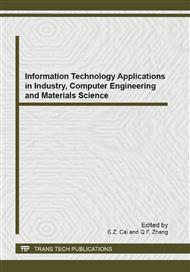p.4292
p.4296
p.4302
p.4309
p.4314
p.4318
p.4322
p.4326
p.4331
A New Study of Assembly Scheduling Effective Constraint Method in Assembly Planning
Abstract:
This paper establishes an assembly planning model combined with the actual assembly process of the complex equipment and based on the equipment characteristic & interactive features. Adding constraints model for complex assembly steps which ensure the assembly validity by the hierarchical constraint assembly drawing built through a detailed analysis of complex constraint relations between the blocks and layers. The fact shows that the model can effectively express the establishment of the assembly sequence based on the equipment level information and hierarchical constraint relations, and in order to achieve the assembly relationship the decomposition and timing, make the interactive process is simple and easy to operate.
Info:
Periodical:
Pages:
4314-4317
Citation:
Online since:
September 2013
Authors:
Keywords:
Price:
Сopyright:
© 2013 Trans Tech Publications Ltd. All Rights Reserved
Share:
Citation:


